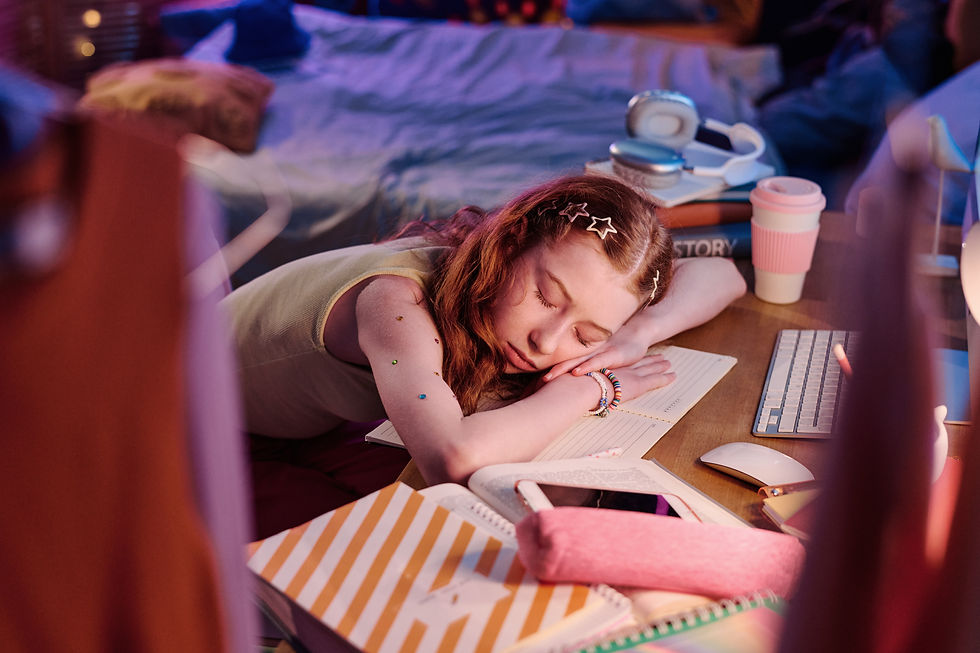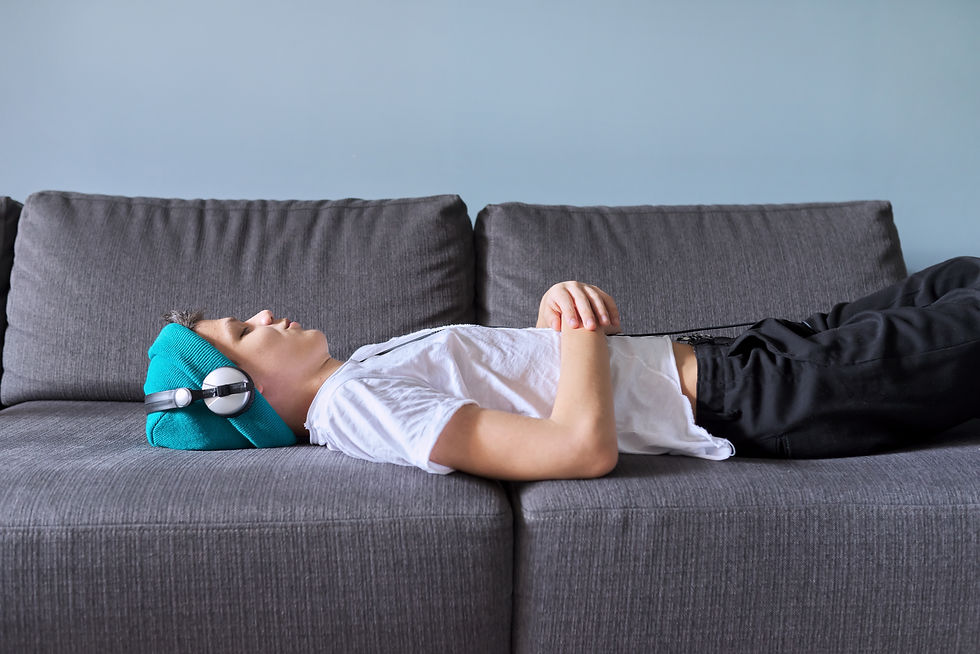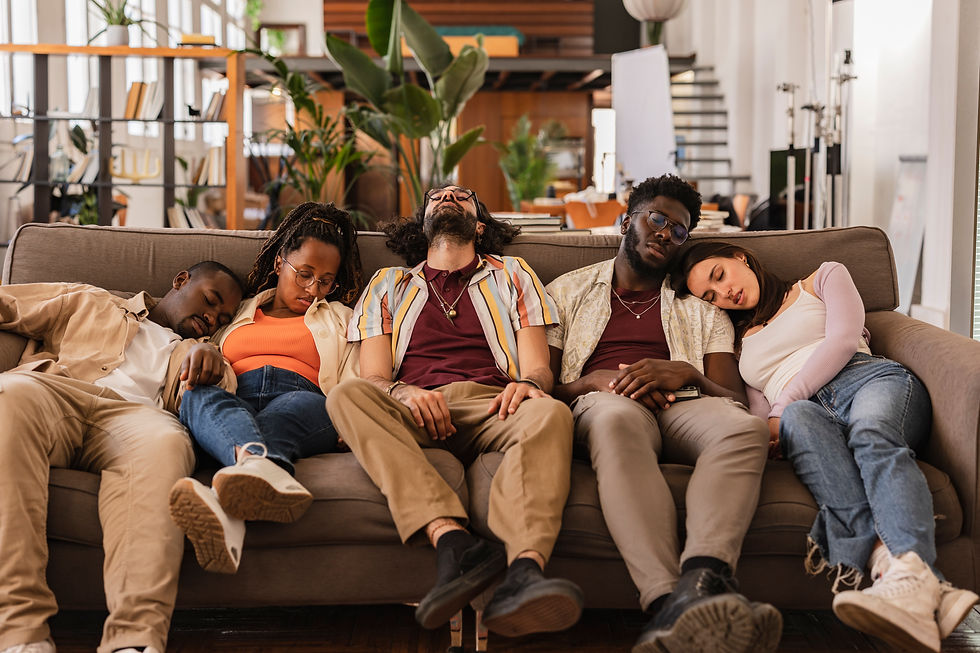Why do so many teenagers struggle with sleep?
- Sophie Bostock, PhD

- Aug 20, 2025
- 7 min read
Updated: Aug 24, 2025

Across the world, teenagers sleep too late, and too little. Teenagers are thought to be the population most at risk of chronic sleep deprivation (Carskadon 2011). Research suggests that today’s adolescents are sleeping more than an hour less than they were 100 years ago (Matricciani 2012).
So why do teenagers struggle to get enough sleep? Why does this have such important consequences for their mood and academic achievement?
How much sleep do teenagers need?
Sleep experts recommend that most teenagers need to sleep for 8 to 10 hours each night (Hirshkowitz 2015). While 8 hours is the recommended minimum, a minority of teens will thrive on a bit less, while others may need more than 10 hours. Younger teens, and those who do a lot of sport for example, are likely to need more sleep than older teens, or those who are less active.
Data from the US suggests that only around 15% of teenagers are routinely getting more than 8 hours sleep. Fewer than 7 hours of sleep on a regular basis is likely to lead to symptoms of sleep deprivation including poor concentration, irritability, more impulsive behaviour, mood swings, sleepiness, memory lapses, frequent infections or low motivation.
Sleep timing and consistency can also influence the quality of sleep, and how you feel during the day. The ideal is to wake up and fall asleep at a similar time each day, rather than a more typical teenage model of sleeping less during the week and attempting to catch up on weekends.
+++
At every age, your sleep need is unique to you. To find your natural sleep need, find a few days when you can wake up without an alarm (probably during the holidays). Go to sleep when you’re sleepy, and let yourself wake up naturally. After a few days of paying back any sleep debt, you probably will settle into a pattern of waking naturally when you have satisfied your sleep need.
+++
Why do teenagers struggle to get enough sleep?
Some parents believe that teenagers are being difficult when they refuse to go to bed early. In fact, this is probably because of their unique biology, rather than that they are deliberately choosing to resist sleep. Teens are also vulnerable to sleep deprivation as a result of busy schedules, hormonal fluctuations, and social media distractions.
Let’s explore these sleep challenges in more detail…
Teenage sleep biology: teen body clocks are different
The two main influences on sleep timing are called circadian rhythms, or body clocks, and sleep pressure; both of these change in response to puberty.
Our body clocks are programmed for us to be active during the day, and to rest in the dark at night, but our preferred bedtime varies a lot. Our innate preference for sleep-wake timing is called our chronotype, and can change at different ages. Young children and the elderly tend to wake up and fall asleep early; they are most likely to have an ‘early bird’ chronotype. Teenagers and young adults typically have a ‘night owl’ chronotype; this means they rarely feel sleepy before 11pm (often later), and will struggle to feel fully alert until after 10am.
An alarm going off at 7am for a teenager feels like waking at 5am for most adults!
In the evening, the sleep hormone, melatonin, signals the brain and body to prepare for sleep. Adults usually start to produce melatonin before 9pm, around 90 minutes before the onset of sleep, whereas the average teen’s melatonin production starts several hours later. Expecting a teenager to go to bed at 10pm is a bit like asking an adult to be in bed at 8pm; most of us are just not that sleepy.
In addition to our body clocks, a second drive to sleep comes from the build up of a drowsy-inducing chemical called adenosine. The more hours we’ve been awake, the greater the sleepiness from adenosine; this is called ‘sleep pressure’. Sleep pressure accumulates in teens more slowly than in adults, which is another reason they feel sleepy later than their parents.
Teenagers are particularly vulnerable to sleep deprivation because they have to operate at odds with their body clocks to wake up and get to school. They have to get up early, but if they only rely on sleepiness as a cue for sleep, they won’t want to get into bed until after midnight, which means it is unlikely that they will achieve their recommended 8+ hours of sleep during the week unless they make a concerted effort to go to bed early.
Teens will often sleep in on weekends in an attempt to catch up on lost sleep. Although this might sound like a sensible strategy, the rapid switching of the body clock every Monday morning can cause more stress on the body and add to feelings of fatigue.

Teenage sleep, stress and competing demands
For many teenagers, life can feel overwhelming. School and homework have to be balanced with extra-curricular activities and social time, any of which can squeeze time for sleep. Older teens may also have part-time jobs or caring responsibilities. There can also be pressure to prepare for exams, make decisions about a future career or just to fit in with friendship groups.
Stress results in the activation of the ‘fight or flight’ stress response, which directly interferes with sleep. Whatever our age, if we feel stressed at our normal bedtime, the release of stress hormones means that we feel less sleepy, and if we do fall asleep, we are more likely to wake up during the night.
Teenage sleep and puberty
Delays to the body clock typically appear around the onset of puberty, when there are surges in sex hormones. For girls in particular, puberty can also be accompanied by difficulties falling asleep and waking up during the night. Fluctuations in oestrogen and progesterone can have an unsettling impact on sleep. Girls who experience pre-menstrual syndrome (PMS) often report insomnia symptoms, disturbed dreams or excessive sleepiness during the day.
Teenage sleep and screen time
Research has found that the more time teenagers spend on screens, the more likely they are to suffer from sleep deprivation, and poor sleep quality. However, teens who have sleep difficulties are also more likely to reach for their phones as a distraction, so it’s unlikely that the screens are entirely responsible for poor sleep.
Exposure to bright light before bed can delay and interfere with melatonin, which will make teens less sleepy. Screens tend to emit light which is rich in blue wavelength light, which has a particularly alerting effect on the body clock. However, the intensity of light from screens tends to be very low. Bright overhead lights could have a stronger alerting effect.
A major disadvantage of getting engrossed in phones or video games before bedtime is that they displace sleep time. Teens in flow during a video game find it hard to switch off and go to sleep.

Why is sleep so important for teens?
The recommendation to get at least 8 hours of sleep is drawn from hundreds of studies looking at the association between the amount of sleep teens get and short term outcomes like concentration and emotion regulation, as well as long term outcomes like risk of diabetes and weight gain. Sleep is related to these outcomes at all ages, but during adolescence the entire body, including the brain, is still undergoing major developmental changes.
Sleep and risky teen behaviour
The brain’s prefrontal cortex matures during the teenage years and early adulthood. The prefrontal cortex is responsible for our ability to think about the consequences of actions, solve problems and control impulses. This is why teenagers are more prone to risky behaviour, stronger emotions and impulsive decision making than adults.
Sleep deprivation at any age can impair the performance of the prefrontal cortex, but in teenagers, who start with lower capacity, the effects are more marked. Studies have found that sleep deprived teens are more likely to engage in a range of risk taking behaviours including smoking, drinking alcohol, risky sexual behaviour and failure to use a seatbelt.
The teenage brain is busy remodelling during sleep; pruning back unwanted connections, and strengthening others. Experiences during adolescence have potential to shape longer term habits.
Sleep, learning and academic performance
When we learn new information, we rely on short-term storage in our working memory in the middle of the brain. This works a bit like a USB drive; it only has limited capacity. During sleep, important memories are moved into the larger cortex, which is like the brain’s hard drive. This transfer frees up more capacity for us to concentrate and learn the next day.
Sleep deprived teens find it harder to pay attention in class, to think creatively or to retain new facts. Several studies have found a link between lack of sleep and poor academic performance. For example, a recent Icelandic study tracked sleep in 16 year-old teens for 7 days. Shorter sleepers, and those with a more inconsistent sleep schedule had lower test scores in maths, english and icelandic (Seffansdottir 2022).
Sleep and emotional health
While the prefrontal cortex is still developing, teenagers rely on a part of the brain called the amygdala to make decisions and solve problems more than adults do. The amygdala is responsible for switching on the ‘fight or flight’ stress response. It is associated with emotions, aggression and instinctive behaviour.
When 14–17-year-olds’ sleep was restricted to 6.5 hours for 5 nights - similar to a school week - teens rated themselves significantly higher in anxiety, hostility, confusion and fatigue; their parents also rated them as more irritable and antagonistic (Baum 2014).
Sleep and physical health
Lack of sleep can interfere with the production of growth hormone and testosterone, which help to repair damaged tissues and develop muscle, especially in growing bodies. There are strong links between sleep and metabolism, with both short and long sleep (>10 hours) linked to decreased insulin sensitivity, which is a marker of risk for diabetes (Javaheri 2011). This may be partly because less sleep is linked to less physical activity, and more sedentary behaviour. One recent study found that both lack of activity and night to night variation in sleep timing were linked to higher body fat in teenagers (Rognvaldsdottir 2021).


Detailed and practical, this guide explains concrete rebar in a way that feels approachable without oversimplifying. The step by step clarity is especially useful for readers new to the subject. I recently came across a construction related explanation on https://hurenberlin.com that offered a similar level of clarity, and this article fits right in with that quality. Great شيخ روحاني resource. explanation feels practical for everyday rauhane users. I checked recommended tools on https://www.eljnoub.com
s3udy
q8yat
elso9
Using technology to increase access to youth mental health support may offer a practical way for young people to reach guidance, safe-spaces, and early help without feeling overwhelmed by traditional systems. Digital platforms, helplines, and apps could give them a chance to seek support privately, connect with trained listeners-orexplore resources that might ease their emotional load. This gentle shift toward tech-based support may encourage youth to open-up at their own pace, especially when in-person help feels too heavy to approach.
There is always a chance that these tools-quietly make support feel closer than before, creating moments where help appears just a tap away. Even a small digital interaction might bring a sense of comfort. And somewhere in that space, you…
A very insightful and thoughtfully written article. The points are clearly presented and beneficial for readers looking for reliable information. Great work, and thank you for sharing. Bills Rivalry Jersey
Excellent blog post with useful and well-explained information. I appreciate the effort put into making the content both informative and easy to follow. Thank you for sharing this valuable resource. Arsenal Varsity Jacket
Outstanding article! I want people to know just how good this information is in your article. Your views are much like my own concerning this subject. I will visit daily because I know It will very beneficial for me Joe Burrow Suit